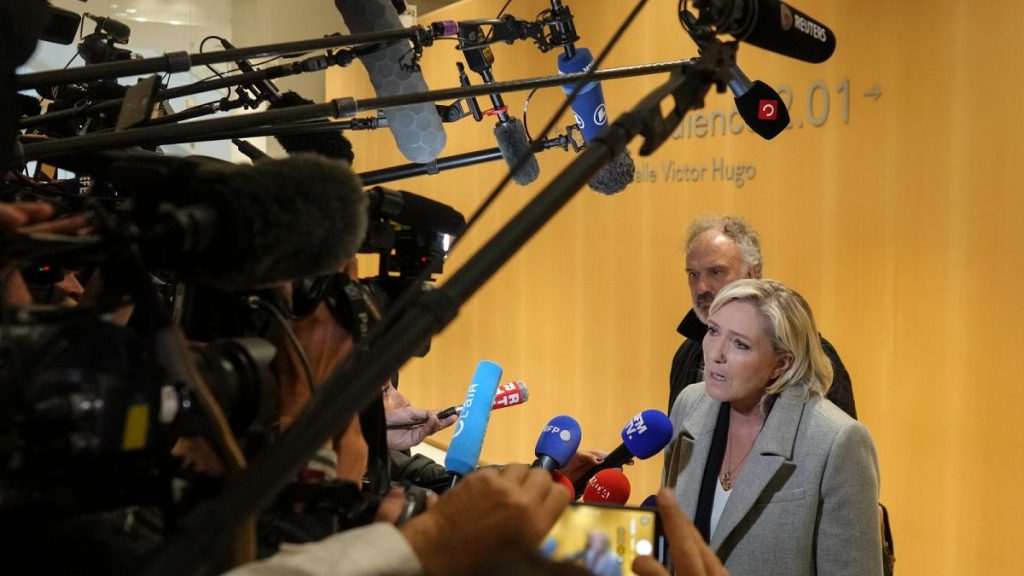A trial is currently taking place against more than 20 former and current members of the French far-right National Rally (RN) for charges related to allegedly misusing EU parliament funds to pay individuals who were actually working for the national political party during a fiscal crisis. Prosecutors are accusing RN of having a centralized system for intentionally misusing the money, while the defense is arguing that the payments were appropriate for the staffers’ job descriptions. If convicted, those charged could face penalties of up to 10 years in prison, fines of up to €1 million, and ineligibility to run for elected office for five years. Among those on trial is former party leader Marine Le Pen, who remains calm and maintains that no rules were broken. The defense has raised technicalities such as asking for the EU Court of Justice to address the nature of parliamentary assistants’ work, and the European Parliament, also a plaintiff in the case, believes that the trial involves fraudulent use of parliament funds.
The trial has sparked debate over the roles and responsibilities of parliamentary assistants, with Le Pen’s lawyer arguing against turning them into civil servants and pointing to examples of assistants working in the French National Assembly. The European Parliament, however, believes that the trial involves the fraudulent use of its funds which has affected the confidence of voters who elected the MEPs. One of the politicians on trial, Bruno Gollnisch, is accused of using EU parliament funds to pay for the private secretaries and chief of staff of the party’s co-founder Jean-Marie Le Pen. Despite assertions that the trial is not political in nature, Gollnisch believes it is meant to tarnish the party’s reputation and has defended the recruitment of parliamentary assistants working for the political group of their MEPs. The European Parliament argues that European citizens and French taxpayers are also victims in the case because the funds involved came from European public money, which has caused financial and reputational damage to the body.
This trial is not the first major embezzlement trial in France, as the centrist Democratic Movement party (MoDem) recently faced the same court for misusing EU funds. Several party members received suspended prison sentences, but MoDem leader François Bayrou was acquitted. Comparisons have been drawn between the two cases, with the director of the Paris Institute for Criminology and Criminal Law pointing out that the evidence against the RN party leadership appears to be more substantial compared to the MoDem case. The case is being tried in France because the acts were committed at least in part within the country, and European law requires countries to protect European public money just as they do their own. Despite arguments from the defense that the trial is not political in nature, the case has raised questions about the use of EU parliament funds and the responsibility of MEPs in managing public money.
The trial of more than 20 former and current RN members accused of misusing EU parliament funds has raised concerns over the implications for French and European taxpayers who are viewed as victims of the alleged embezzlement. The defense has argued that their clients have not committed any offenses and have defended the payments made to individuals who were working for the national political party during a time of fiscal crisis. During the trial, discussions have touched on the roles of parliamentary assistants, with lawyers debating whether these individuals should be considered civil servants and highlighting the various interpretations of their job descriptions. The European Parliament, which is also a plaintiff in the case, believes that the trial involves the fraudulent use of its funds, which has harmed its financial standing and reputation.
The trial, which is expected to last for two months, has brought to light the complexities surrounding the use of EU parliament funds and the responsibilities of MEPs in managing public money. Former party leader Marine Le Pen remains confident and maintains that no rules were broken, while the defense has raised technicalities and pointed to examples from the French National Assembly to support their arguments. Despite assertions that the trial is not politically motivated, some of those on trial believe that it is an attempt to discredit the party and its members. The comparison with the MoDem case, where several party members were convicted for misusing EU funds, highlights the differences in evidence and implications for party leadership. With potential penalties of up to 10 years in prison and fines of up to €1 million, the outcome of the trial will have significant consequences for those charged and could set a precedent for future cases involving the misuse of European public money.













